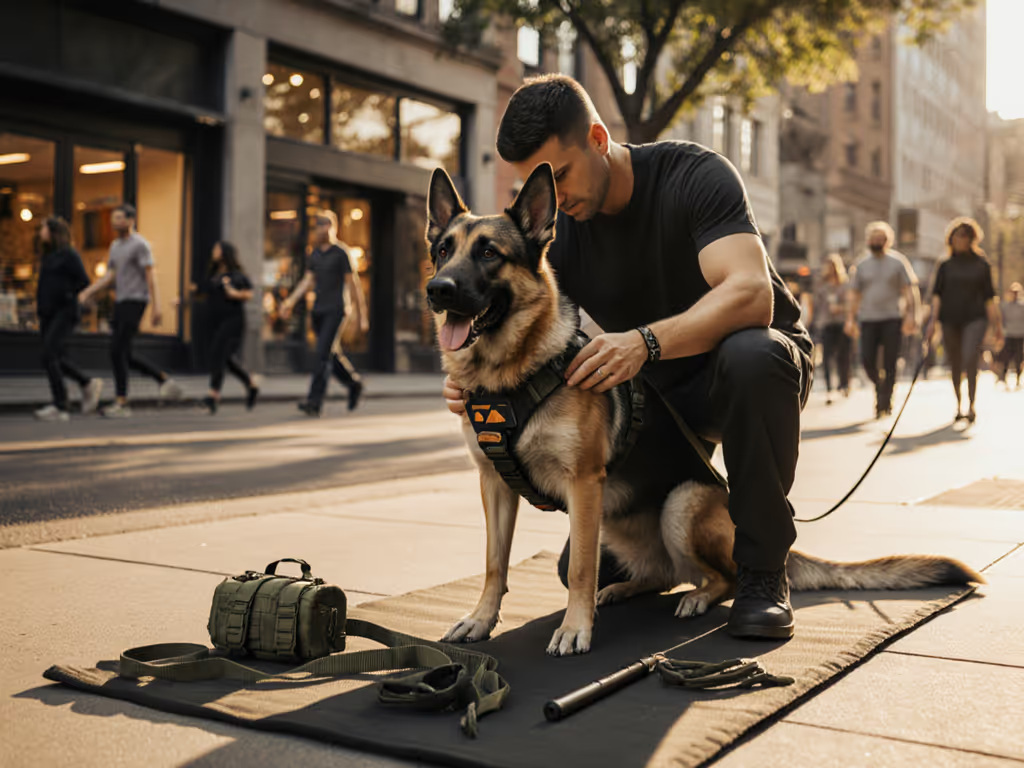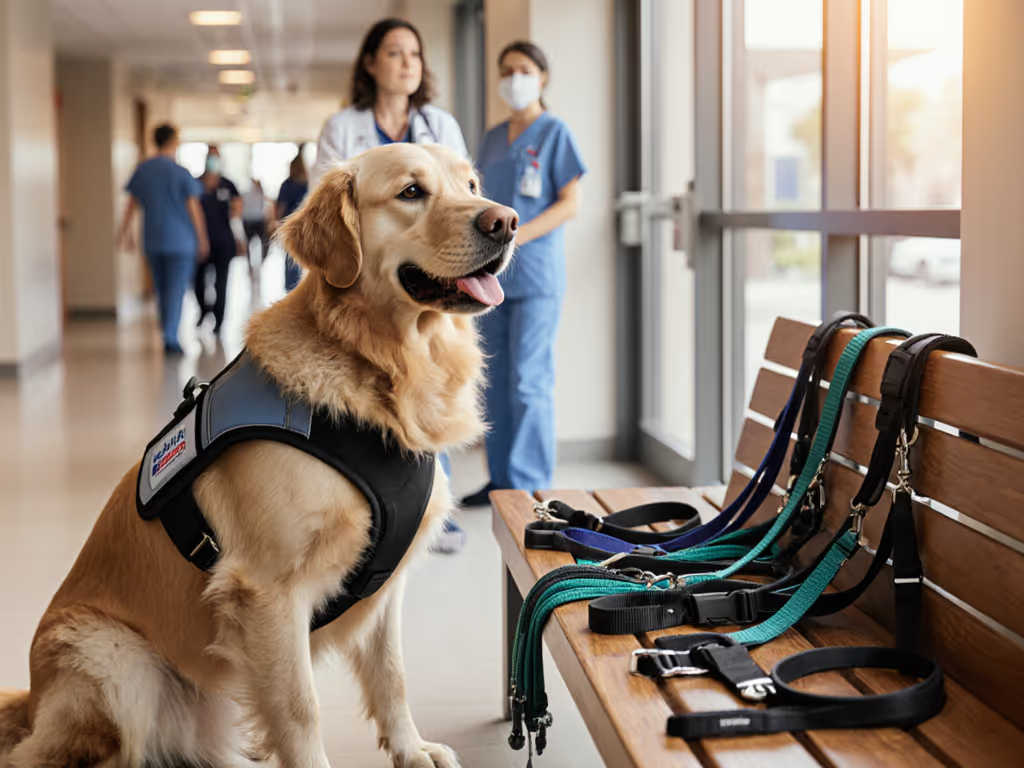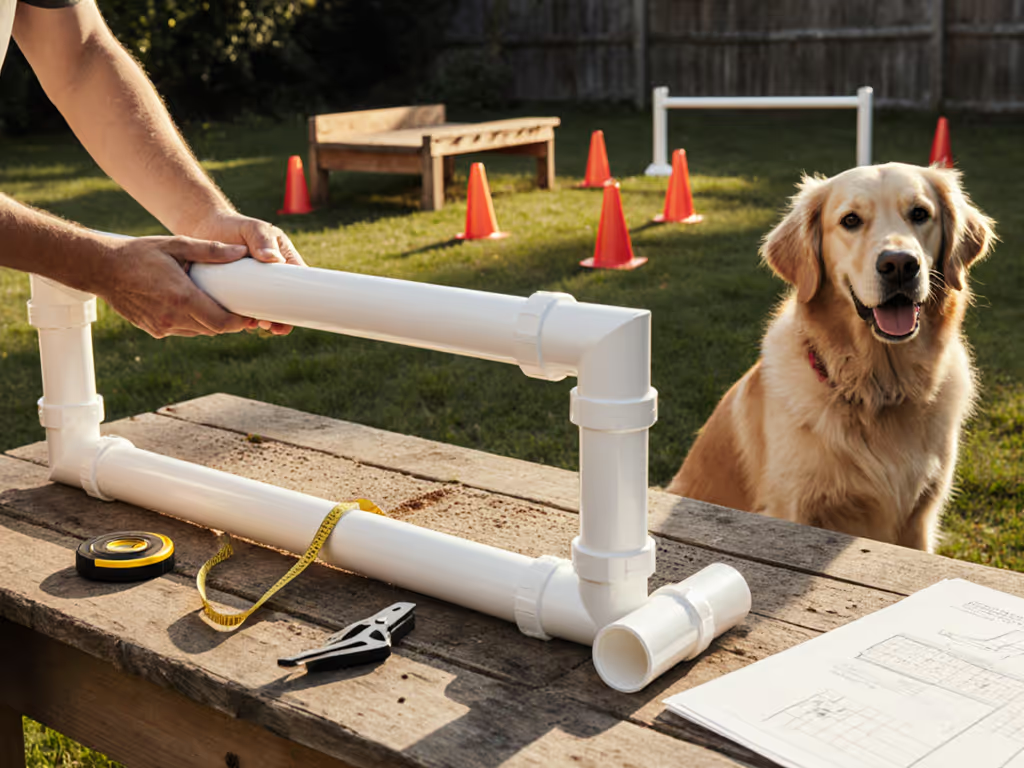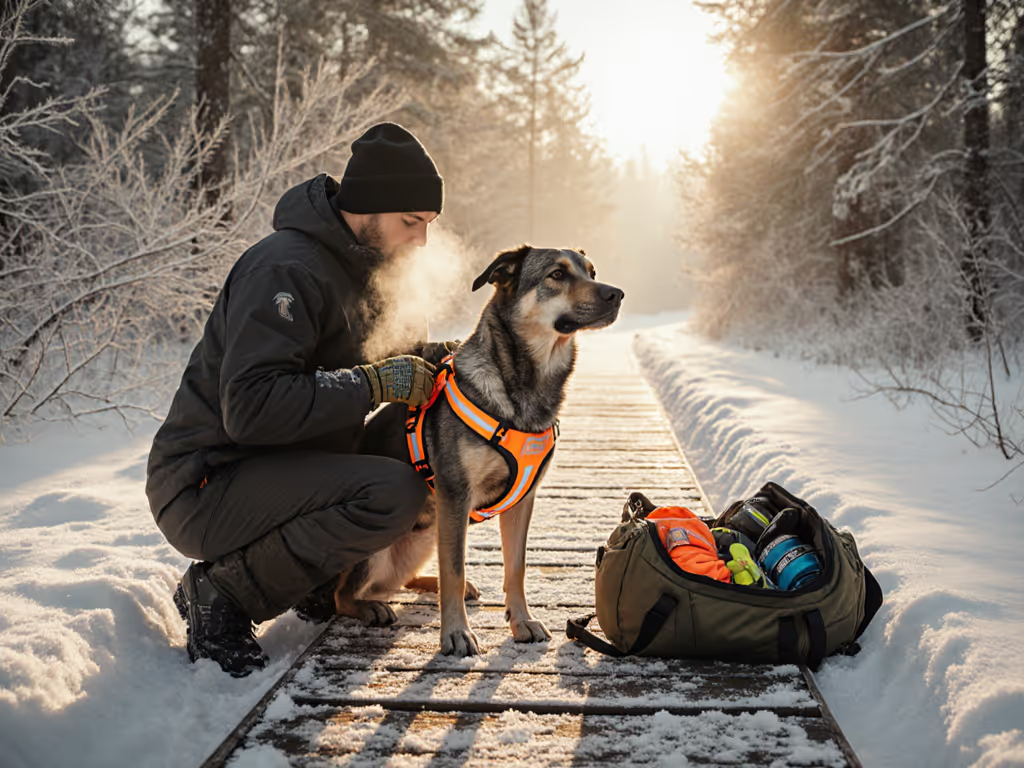
Scent Work Training Kits: Trusted Beginner to Competition Gear
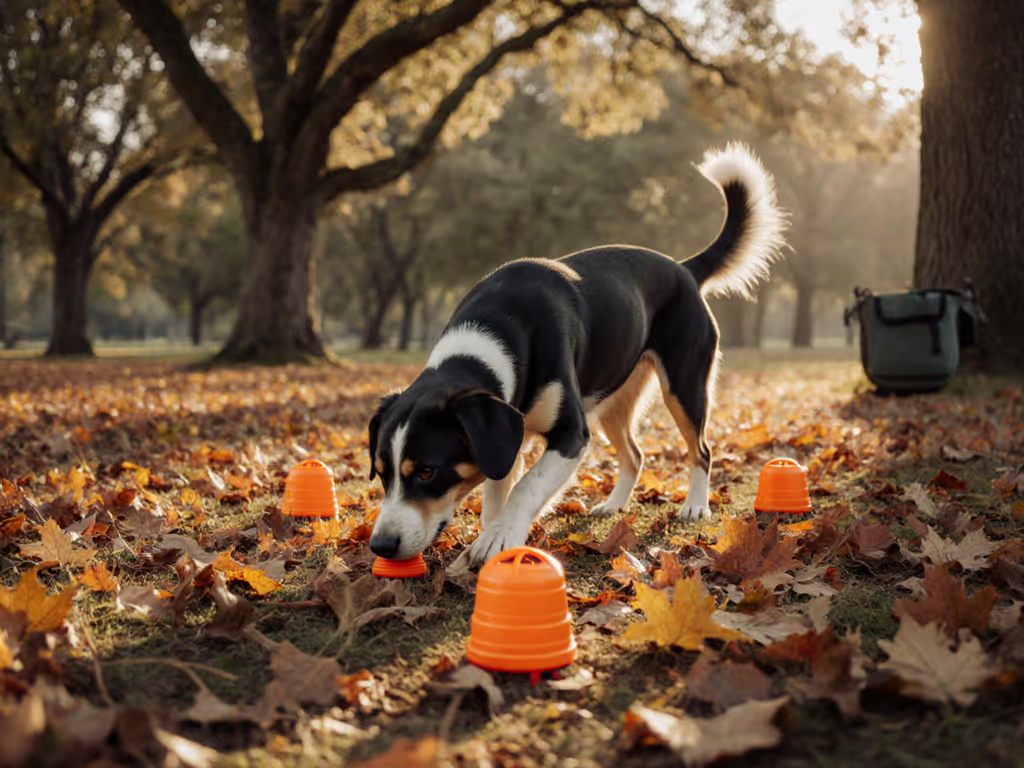
You've tried everything for loose leash walking: treats, special collars, even whispering sweet nothings, but your dog still lunges toward squirrels like a furry rocket. What if the secret isn't pulling them back, but redirecting that powerful nose? Scent work training kits unlock your dog's natural instincts to build focus right where you need it most: on walks. And when paired with thoughtful dog nosework equipment, they transform chaotic outings into calm, connected moments. Let's explore how the right tools, used in gentle stages, can rewire reactivity from the hallway to the busiest street. It's not about perfect obedience, it's about small wins that stack.
Why Your Dog's Nose Holds the Leash Key
That frantic pulling? It's often your dog's attempt to engage their superpower: scent detection. They're not ignoring you, they're overwhelmed by a world of smells crashing in at once. Without channeling this instinct, even the kindest handler burns out trying to compete with biology. I've seen guardians arrive in tears after failed walks in apartment hallways, convinced their dog was "broken." But what if we could make that hallway the training ground? Small wins, stacked safely, build calm, confident teams. Scent work isn't just a sport, it's leash manners by stealth. To pair nosework with real-world focus, see our distraction training guide.
The Overwhelm Trap: Why Good Guardians Buy Wrong Gear
You're scrolling through endless "scent detection kits" online, paralyzed by choices:
- Flimsy tins that leak essential oils onto your carpet
- Kits missing critical beginner pieces (like unscented cotton swabs for neutral practice)
- Oily pads that confuse novice noses with artificial scents
It's exhausting. You invest $30-$50, only to realize too late:
- Your kit lacks container variety for progressing through AKC stages
- The scent strength overwhelms beginners (causing frustration for both of you)
- No clear path from "find the tin under the couch" to "locate odor in a crowded park"
This isn't your fault. Most products promise competition-ready results but skip the human part: how to actually use them when you're stressed, short on time, or practicing in a 600-square-foot apartment. You end up with another drawer full of unused gear, and more guilt.
Lower the criteria, keep the success flowing.
What Truly Beginner-Friendly Kits Need: A Trainer's Checklist
Forget "competition-ready" claims. True beginner kits must honor four pillars Sofia uses daily with time-pressed clients:
- Low-Friction Setup: Tools that work in tiny spaces (no backyard required)
- Clear Stage Gates: Defined transitions from home → yard → street
- Stress-Reduction Safeguards: Features preventing handler/dog frustration
- Humane Scent Progression: Odors scaled for developing detection skills
Let's see how two top kits meet this checklist, not as competitors, but as partners for different stages of your journey.
Stage 1: Home Thresholds (The "Hallway Confidence" Builder)
Goal: Dog finds hidden scent while maintaining calm posture near doorways.
This is where most fail: jumping straight to complex searches. But scent work's magic is in micro-reps. Start with 90-second sessions where your dog learns to associate scent with quiet focus, not frantic hunting. You need:
- Odor simplicity: One consistent scent (anise is AKC-approved and beginner-friendly)
- Safe containers: Non-leaking tins that won't pinch curious noses
- Handler posture cues: Tools allowing you to stand calmly (not crouch or hover)
Top Pick: Race&Herd Original Dog Scent Training Kit
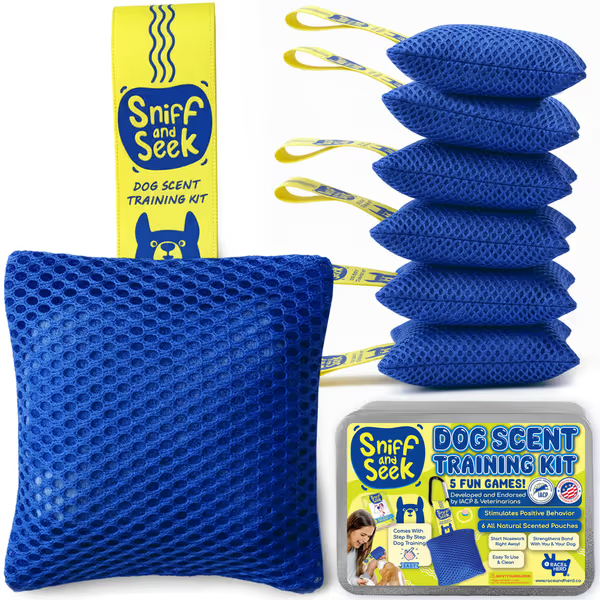
Dog Scent Training Kit
Why it shines for beginner scent training:
- Air-mesh pouches with true anise seeds (not synthetic oils) release scent gently, which is critical for sensitive noses. No overwhelming blast of odor that makes dogs skip or panic.
- Six identical blue/yellow pouches leverage canine color vision for visual-tactile learning. Place one behind the door jamb during leash prep: while your dog waits calmly for walks, they're subtly building scent association.
- Includes carabiner clips to attach pouches to your belt during real walks. Practice "Find it" at street corners. For smooth reward delivery on walks, consider a trainer treat pouch. No extra gear to carry.
Real-world adaptation: When a client's rescue terrier lunged at doorways, we started with one Race&Herd pouch taped inside the apartment door. For 3 days, she'd say "Show me!" as they approached the door. Finding scent means a calm stretch, not a pull. By Day 5, we added a 3-step hallway walk toward the door before the search. Small wins rewired the trigger.
Why This Avoids Beginner Traps
- No setup stress: Pouches are ready in 10 seconds (no oil dipping or cotton swabs)
- Washes beautifully (critical for households with kids and pets)
- Includes 5 progressive game cards showing exactly how to move from "pouch under couch" to "pouch near exit door"
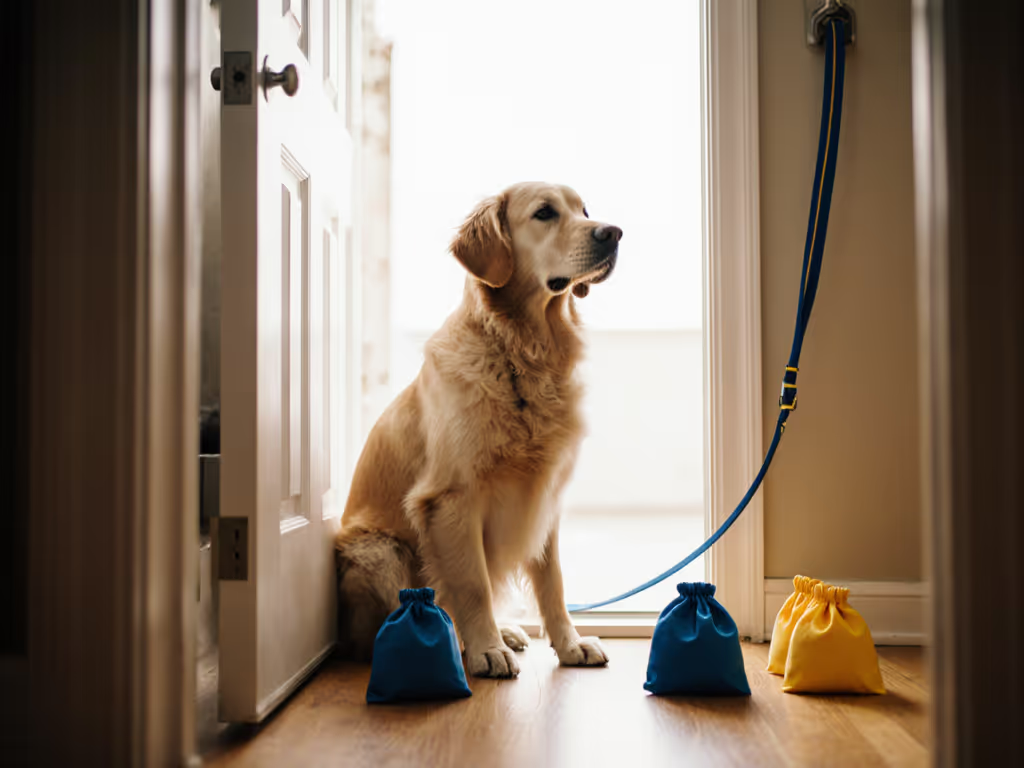
Stage 2: Controlled Context Shifts (The "Yard to Street" Bridge)
Goal: Dog searches accurately outside the home with mild distractions (wind, birds, distant traffic).
This stage breaks most teams. Dogs revert to old habits when environments change. You need gear that:
- Magnifies scent gently (no gusts blowing odors away)
- Works with existing gear (no re-buying for new stages)
- Prevents false alerts (teaching true odor detection, not just "find the tin")
Top Pick: K9King Interactive Scent Training Kit
Why it excels for context shifts (home to street transitions):
- Tin containers with magnetic dots let you anchor scent to fences, benches, or trees, without hiding ability. Crucial for proofing searches against real-world variables.
- Metal tins (not plastic) prevent scent saturation (a common issue where dogs alert to the container, not the odor).
- Includes 5 scented pouches + 5 neutral pouches, which are essential for teaching "is odor really here?" No false-positive training.
Real-world adaptation: For a client whose dog ignored odors near sidewalks, we used the K9King tin clipped to a park bench during actual walks. First week: tin visible, 10 feet from bench. Second week: tin behind bench legs. Third week: tin under bench with controlled distractions (for example, a remote-controlled car 20 ft away). The magnetic base kept it secure during "windy day" practice. It's a detail most kits miss.
Why This Reduces Handler Stress
- Tins open/close in 2 seconds, so there is no fumbling during short reps
- Bright orange color makes it easy for handlers to spot during street transitions
- Fits in a pocket for on-the-go training (no extra bag)
Stage 3: Street-Ready Proofing (Competition Prep Made Accessible)
Goal: Dog alerts consistently in dynamic environments (crowds, multiple odors, novel terrain).
Forget "competition" pressure. At this stage, you're building public confidence, yours and your dog's. You need competition nosework gear that:
- Scales odor intensity (from light breeze to heavy rain)
- Matches AKC/NACSW rules (no disqualifying errors)
- Integrates with daily walks (no "special practice sessions")
How to Combine Both Kits for Real-World Success
| Feature | Race&Herd Kit | K9King Kit | Why It Matters for Street Proofing |
|---|---|---|---|
| Scent Type | Pure anise seeds | Essential oil-based anise | Seeds offer stable scent in humidity; oils work better for dry climates |
| Portability | Carabiner clips for belts | Pocket-sized tins | Clip Race&Herd to harness during walks; stash K9King in pocket for pop-up drills |
| Distraction Proofing | Mesh pouches (odor dissipates) | Metal tins (odor contained) | Use Race&Herd for early street exposure; K9King for high-distraction zones |
| Progression Path | 5 included game levels | Neutral/odor pouch swapping | Builds from "find scent" → "ignore fake alerts" - critical for reliable street behavior |
Pro Tip: Start street proofing during walks. At a quiet intersection, clip a Race&Herd pouch to a signpost. Say "Find it!" as you cross. Reward calm engagement, not speed. Next block, hide a K9King tin behind a fire hydrant. This isn't "extra" training, it's leash manners with purpose.
Critical Safety Note for Urban Environments
Always pair scent work with humane gear familiar to our leash-manners work:
- A front-clip harness (reduces pulling during searches)
- 12-15 ft lightweight line (lets dog explore safely near curbs)
- Treat pouch clipped to your hip (not waist) - prevents bending that stresses dogs
Scent work done poorly increases reactivity (for example, frantic searching near traffic). Stage gates prevent this. If your dog skips or rushes, lower the criteria: move the scent closer, reduce distractions, or shorten sessions. Keep the success flowing.
Your Action Plan: Start Today Without Overthinking
Forget "perfect" kits. Your next step depends on today's reality:
-
If walks feel impossible right now: Buy the Race&Herd kit. Do one 90-second hallway session today: Tape a pouch to the doorframe. Ask for a calm sit. Reward any sniff toward it. That's your win.
-
If you're walking calmly but want street-proofing: Add the K9King kit. Next walk, clip a tin to a bench during a rest stop. Ask "Find it!" before moving on.
Both kits ship fast, and neither requires special scents. Start with anise (included in both). Birch/clove come later.
Remember: That ten-step hallway walk I mentioned? It began with one scent pouch taped inside a closet door. Your journey starts where you are, not where you think you "should" be. Lower the criteria, keep the success flowing.
Confidence Through Calm Reps
Scent work isn't about turning your dog into a detection pro. It's the missing link for leash manners, a way to harness their nose for calmness, not chaos. The right scent detection kits give you structured gates: from frustrated hallway walks to confident street navigation. No gimmicks, no shame, just science-backed small wins.
You don't need more willpower. You need gear that works in real life, on your schedule, in your space, with your dog's unique nose. Today's win? Choosing one tool that meets you where you are. Your calm, connected walks start now.

